Those Who Survived Auschwitz Barely Speak of it. How Then Can We, So Glibly?
I was in Poland recently for a conference, and afterwards, went on a day trip with some friends. Things didn’t start well for me. Not only did my friends get a 4-star hotel for the price of my shabby 70’s-era hostel, but instead of being picked up in a plush minibus like them, I was waved into a black van by two strange men, who couldn’t tell me where we were heading or who was the tour guide. I texted my friends to tell my wife I loved her!
Thankfully I arrived at the right place, where laughter at my predicament soon gave way to a reverent hush . . . For we had arrived at Auschwitz.
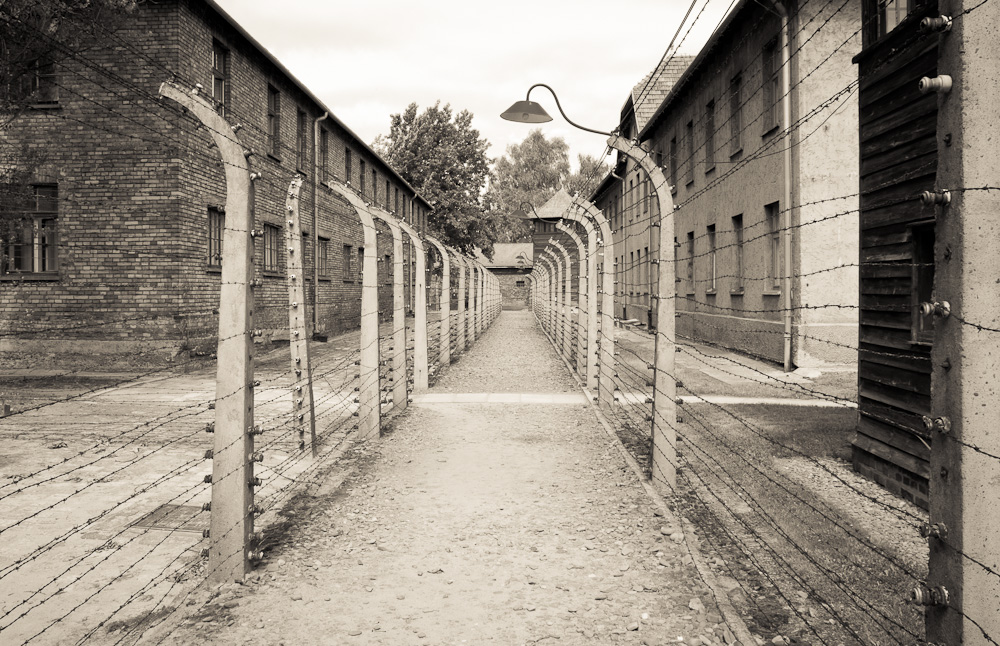

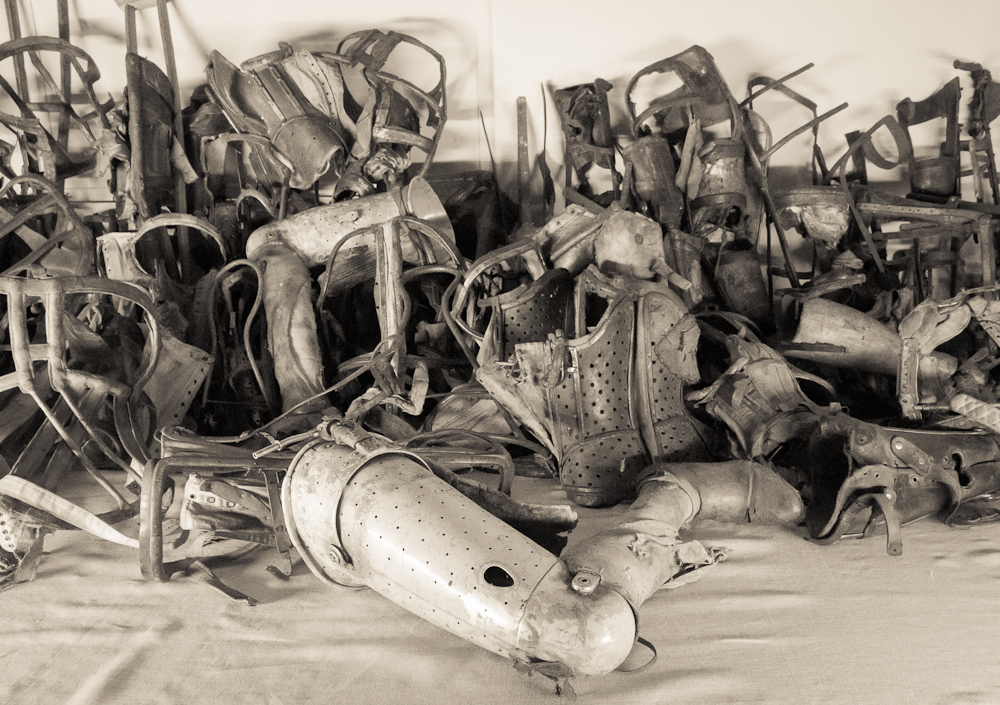
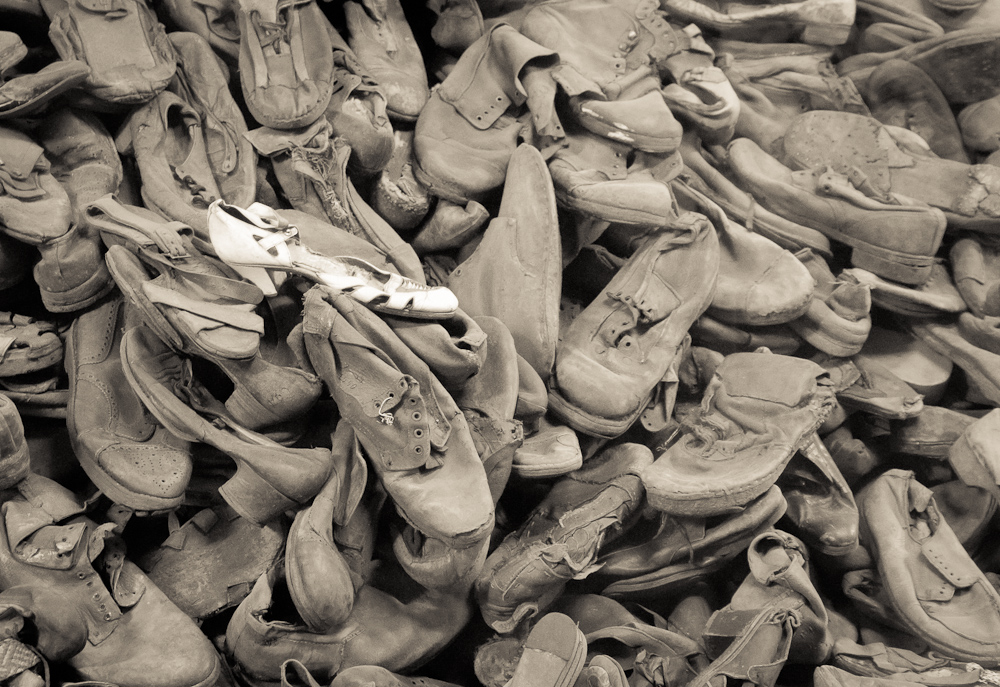
Reverent Hush
Walking along the railway tracks where carriages creaked with human cargo, standing in the spot where an SS guard’s thumb determined a million Jewish fates, filing past piles of prosthetic limbs and children’s shoes discarded moments before their owners stepped into gas chambers, and through barracks full of ghostly, ghastly stories, reverent hush was the only thing appropriate.

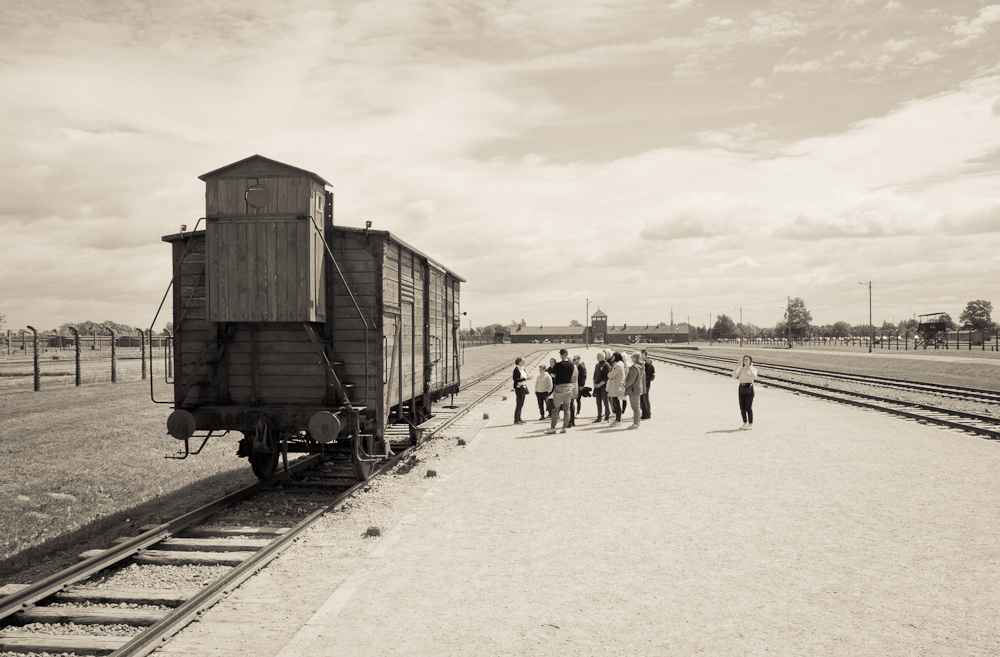
A Place to Silence Arguments
Auschwitz is often used as a knock-down argument in religious and moral conversations. Christians like me sometimes use it to say, Look what happens when a nation forgets God and nationalism takes His place, while others use it to argue the exact opposite, saying How could a good and all-powerful God exist and allow such evil? I wonder now if any of us should use Auschwitz in such a way. When Elie Wiesel tried to write his Auschwitz experience in his memoir Night, he found words fail him. “Only those who experienced Auschwitz know what it was,” he says. “Others will never know.” Since those who were there can barely speak of it, how can we turn it into some glib argument?


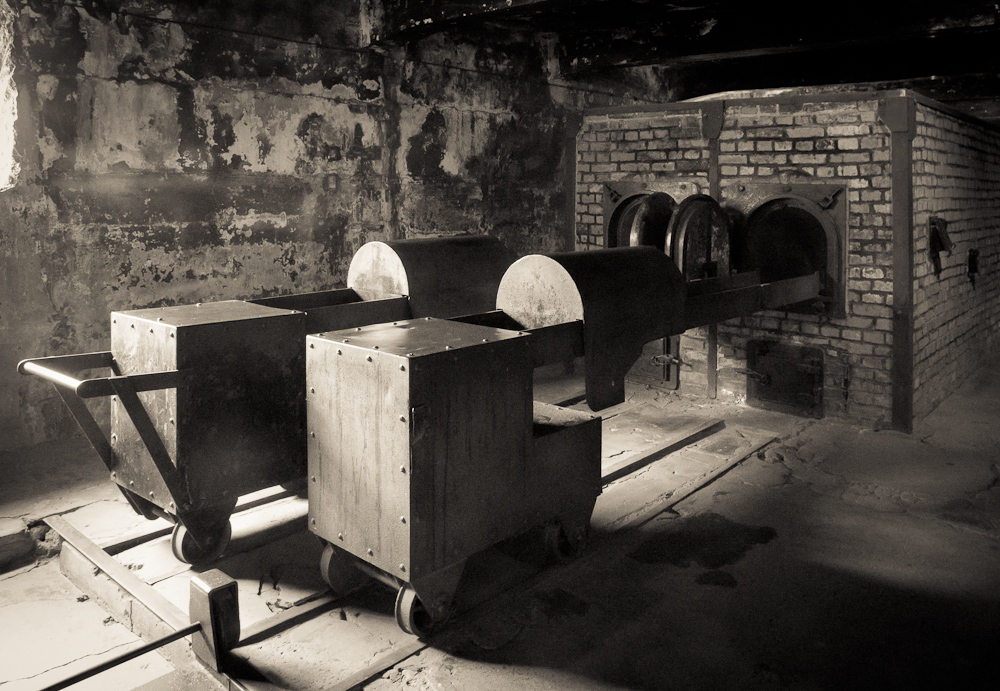
The Witness of Elie Wiesel
On my return home from Poland I re-read Elie Wiesel’s story. It’s fascinating. After all he endured in Auschwitz as a teenager—listening on helplessly as his father was beaten by his side, watching as his family, including his young sister, were burnt in the Nazi’s industrial-scale extermination machine—he somehow turned his suffering into empathy, winning a Nobel prize for his peace-making efforts in places like Israel and South Africa.
But the cost was high not only relationally and emotionally, but spiritually. As he says in Night:
“Never shall I forget that night, the first night in camp, which has turned my life into one long night, seven times cursed and seven times sealed. Never shall I forget that smoke. Never shall I forget the little faces of the children, whose bodies I saw turned into wreaths of smoke beneath a silent blue sky. Never shall I forget those flames which consumed my faith forever.”
Elie Wiesel, Night
“Where were you, God of kindness,” he writes elsewhere. “What was going on in heaven, at the celestial tribunal, while your children were marked for humiliation, isolation and death only because they were Jewish? . . . In my childhood I did not expect much from human beings. But I expected everything from you.”
And yet, having lost his faith, perplexed at God’s seeming absence in Auschwitz, he somehow regained it. “I have said these terrible words,” he later told Krista Tippett, “and I stand by every word I said. But afterwards, I went on praying . . . It’s because I believed in God that I was angry with him, and still am.” Venting his anger and disappointment in God somehow proved his faith was still there. You don’t get angry at someone you don’t believe exists.
In 1997 Wiesel wrote a column for the New York Times, asking God if they can reconcile despite his many unanswered questions. “Let us make up,” he prays, “it is unbearable to be divorced from you so long.”
In the Face of Perplexity

I’ll take many things away from that day in Auschwitz and the stories of those who endured it: To not speak glibly of things I can never fully know. To turn suffering into empathy, and bend evil towards peace-making. I’ll take away the idea that anger at God can be prayer in disguise, and that some stories are so perplexing they should be met only with a reverent hush.
Listen
Listen to Sheridan share an edited version of this article on BBC Radio 2’s Zoe Ball Breakfast Show


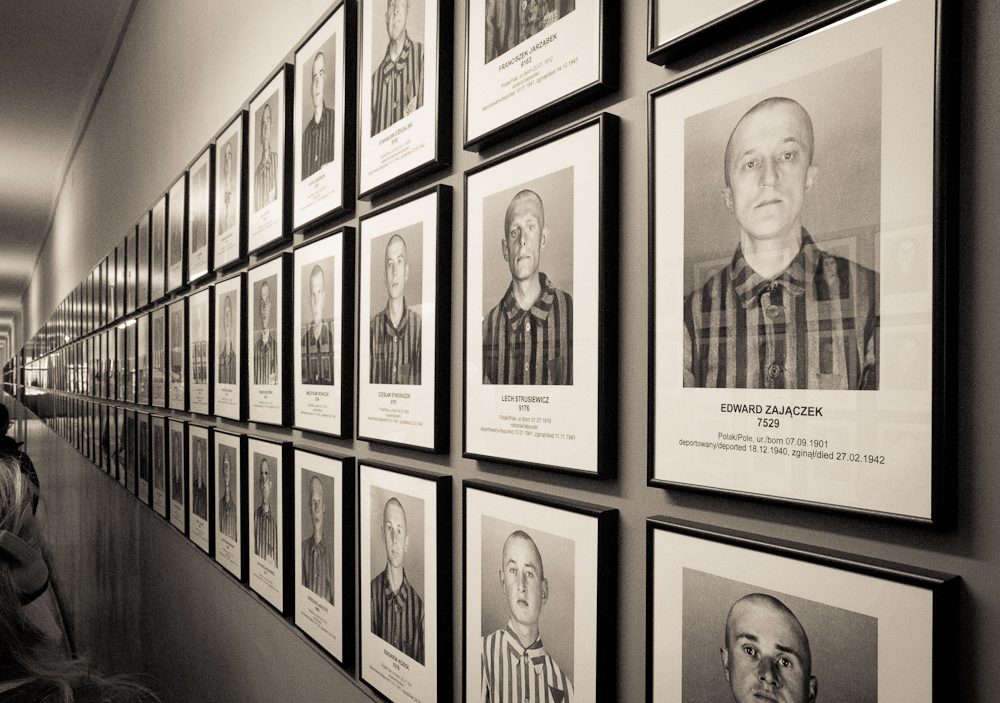
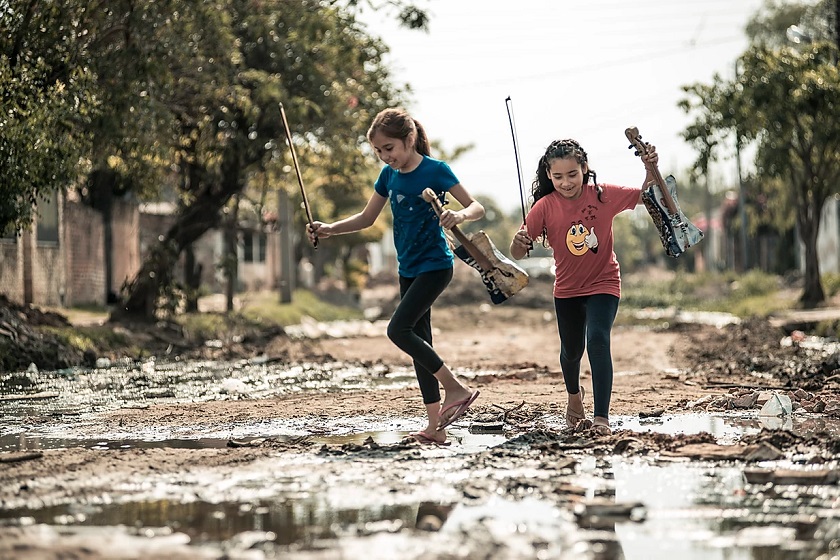
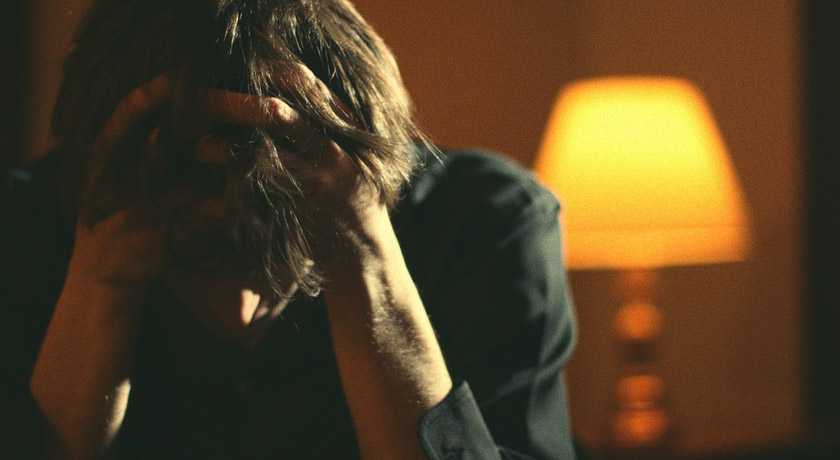
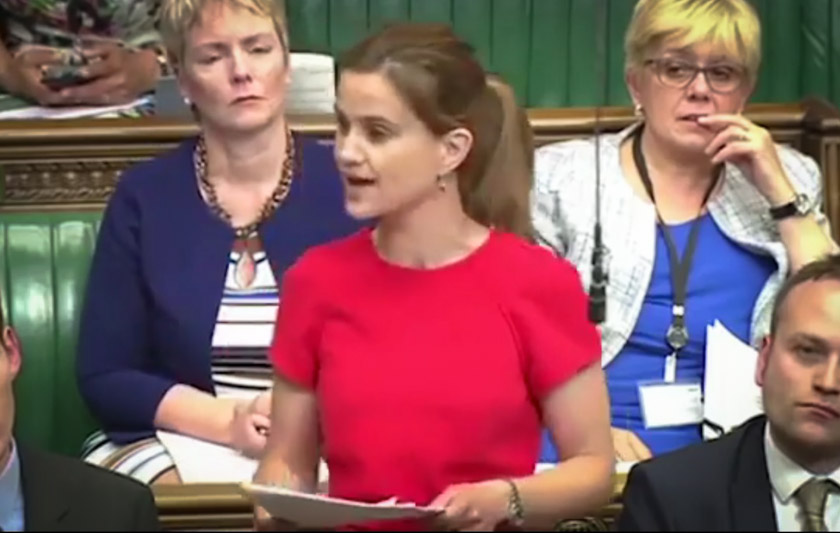
Emmanuel Edirin
Dear Sheridan,
It’s always a pleasure to read from your experience, as not only does it captures the moment like a photograph, but it tells a story to always learn from.
From Africa, a child born in the 70’s may never know the pain and horrors that spurned Europe and a greater part of the world with turbulence over 30-years earlier, except the privilege of a visit, or perhaps been told about this, or stumbled on the literature.
I learnt about Hitler’s madness with these type of camps from a movie, which propelled my inquisitive self to read about that dark and horrifying chapter from available literature.
We would never bring back the loss of hearts and souls from families, friends, and nations who suffered this period of pain, but our sincere prayers would always be with them, for God’s healing and restoration, especially for the nation of Israel, and others within the Europe.
However, as we muse over these obscene pages of humanity’s history, we are compelled to pick the motivation to remind others of God’s redeeming love and reconciliation, a timely message of hope and healing, and good news to the soul.
It is the above encouragement that this world needs more than ever, and is soothing balm for the broken.
Thanks again for inspiring our hearts to love, and giving us motivation to share His kindness, through those sacrifices.
Sincerely,
Emmanuel.
Sheridan+Voysey
Thanks Emmanuel. Wisely said.
Linda
I found a copy of the Elie Wiesel book at one of our local little libraries. It is only a small book – but very haunting. I think it is good to ask ourselves : “How did Germans (including those who believed themselves to be Christian) allow society to get to that point? And how was Hitler able to achieve such power?” Thanks for sharing about your visit, Sheridan.
Sheridan+Voysey
Yes, yes, yes. Let’s learn all we can from what led to the most horrific event in history so it may never be repeated.
Cecilia Kirkman
“Reverent hush ….”
That’s what I have felt too, reading through this article….& you are sooo right; if those who have survived Auschwitz can barely speak of it, how indeed can we who have but only at best, heard of it secondhand, turn it into a glib argument? It can be but unimaginable, & for me, so dreadful I wouldn’t even dare have my imagination venture into …
Yet, what Elie Wiesel braved himself to do, in writing the book, is beyond commendable; a bravery beyond description, & Indeed is so preciously powerful!
The sharing of his “angry prayer” & reaching out his hand to God “if they can reconcile despite his many unanswered questions’, is priceless! I love his honesty, & his humble admission of having found it unbearable to have been “divorced from God” for so long …
I can imagine God weeping as He heard Elie say that too ….
Thank you.
For a (well, as good as…) “non reader” it’s snippets of articles like these that have enabled me not to have entirely missed out on the equivalent of Crown Jewels, too precious to see at close range!
Only reverent hush is appropriate in the unveiling of such gems. So, once again, thank you.
Sheridan+Voysey
Thanks for receiving the message as it was intended, Cecilia. We have so much to learn from the Elie Wiesel’s of the world.
Miranda
My great uncle was one of the medical corps at the liberation of Belsen. He never spoke about it and was certainly a church goer when I met him, but must have been angry at God.
I am angry at God right now. I am angry that the charming Ukrainian woman I met on Sunday has to be here in the first place while her husband is checking dead bodies for land mines. I am angry that her child is deeply traumatised. I am angry that Putin exists . So thank you , dear Sheridan , for writing as you did because I think many of us needed it .
Sheridan+Voysey
May God hear your anger and turn it into prayer, then empathy, then peaceable action. Bless you, Miranda.
Mark Reed
Sheridan—do you believe that God has different “degrees of punishment” in Hell? Are there different degrees of the severity of punishment that God has. I mean–do Hitler and Stalin, and say, Putin has the same punishment as a person who never repents of an “average” crime such as bearing “false witness” against their neighbor???
Sheridan+Voysey
There do seem to be different degrees of punishment mentioned in scripture (eg. It will be “more bearable for Sodom and Gomorrah…” “for Tyre and Sidon…” Matthew 10:15, 11:22-24), and based on how much perpetrators were knowledgeable of what they were doing (Luke 12:47-48). This speaks of catastrophic punishment for those meting out torture at Auschwitz…
Bethany Yagci
I understand why they were angry with God, when they were living hell on earth. Nobody deserves any one day of what they went through, nevermind years. But I’m convinced that God took them for Himself in one of the many unseen wars against evil.
Keith Bower
Hi Sheridan,
I imagine my feelings were somewhat similar to your having, visited the Museum of Tolerance in LA. It is dedicated to the horrors of those concentration camps in Poland. It has 4 key words: Contemplate, Remember, Motivate and Celebrate. One other quote I picked up from my visit was: “ Change the way you see the world and YOUR role in it.”
I recall being devastated during my morning there, but the stark reality of being actually there must have been chilling.
It seems incomprehensible that those acts were perpetrated with the enemy encouraging such abhorrent behaviour. I can comprehend Elie’s comments to and with God, as the same attitude occurred recently on a news flash from Ukraine, when an elderly lady said “where is God?”
Thanks for the blog. It has never been on my bucket list and will stay off it for good now.
Cheers,
Keith
Sheridan+Voysey
Thanks for your comment, Keith.
Bruce
Thanks Sheridan, powerful. I read Art Spiegelman’s graphic novel ‘Maus’ about the Holocaust a decade ago, one of the most moving books I’ve read.
Sheridan+Voysey
I haven’t read Maus but should one day. Thanks Bruce.
Liz Carter
Thank you for sharing this deeply moving and thought provoking post, Sheridan. Your photographs are haunting and vivid. I remember reading elie Weisel’s book in school and being profoundly affected.
Sheridan+Voysey
Thanks Liz. Night really is a profound book.
Michelle Vergara
Thank you for sharing your experience, Sheridan. It’s true, there really are no words I read Elie Wiesel’s book Night with my son when he was in high school and it impacted us both. I was glad we read it together.